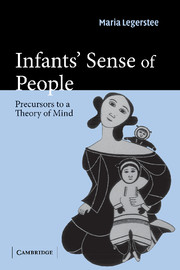Book contents
- Frontmatter
- Contents
- Preface
- 1 Definitions, theories, and plan of the book
- 2 Endogenous and exogenous influences in development
- 3 Animate/inanimate distinction
- 4 Self and consciousness
- 5 Dyadic interactions
- 6 Triadic interactions – Joint engagement in 5 and 7-month-olds
- 7 Social influences on infants' developing sense of people
- 8 Affect attunement and pre-linguistic communication
- 9 The quality of social interaction affects infants' primitive desire reasoning
- 10 Social cognition – affect attunement, imitation, and contingency
- References
- Index
Preface
Published online by Cambridge University Press: 22 September 2009
- Frontmatter
- Contents
- Preface
- 1 Definitions, theories, and plan of the book
- 2 Endogenous and exogenous influences in development
- 3 Animate/inanimate distinction
- 4 Self and consciousness
- 5 Dyadic interactions
- 6 Triadic interactions – Joint engagement in 5 and 7-month-olds
- 7 Social influences on infants' developing sense of people
- 8 Affect attunement and pre-linguistic communication
- 9 The quality of social interaction affects infants' primitive desire reasoning
- 10 Social cognition – affect attunement, imitation, and contingency
- References
- Index
Summary
A few years ago I received a call from Sarah Caro, senior editor with Cambridge University Press, who asked me to write a monograph about my research on infants' understanding of people. The timing was opportune as I had concluded various published studies and had several others in progress. I felt it was time to think about how to fit them into a developmental story. I decided to accept Sarah's generous offer.
My work belongs to a somewhat specialized view that (1) proposes that infants have an innate sense of people at birth, which is activated through sympathetic emotions, (2) questions the idea that infants use physical parameters such as contingency or motion to distinguish people from things, and (3) does not accept the assumption that infants are mechanical creatures before they become psychological ones.
This book is the product of twenty years of academic development and family life. Many people have contributed to the way I think about infants and their development. My first (undergraduate) mentor Jean Koepke, with whom I conducted my Honors thesis on neonatal imitation, proposed that it was more rewarding if, in addition to having children, one knew how their mental lives developed. My second mentor and friend, the late Helga Feider, with whom I examined pronoun development and prelinguistic mother–infant interactions, demonstrated how an understanding of mental lives of even very young infants could be examined through communication.
- Type
- Chapter
- Information
- Infants' Sense of PeoplePrecursors to a Theory of Mind, pp. vii - viiiPublisher: Cambridge University PressPrint publication year: 2005



